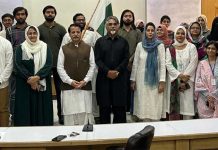KARACHI: Wastewater recycling systems should immediately be introduced in Karachi to increase green cover without further depleting the scarce water resource for residents of the city, says a Press release.
This was one of the unanimous demands by the concerned speakers who spoke at a moot titled “Climate Change and our responsibilities” at the Arts Council, Karachi. The National Forum for Health and Environment (NFEH) in collaboration with Arts Council of Pakistan and EHS Services organised the programme to mark World Environment Day.
The speakers, including concerned environmentalists, were of the view that household wastewater could easily be recycled for its use to increase tree cover in the city.
They said that besides wastewater recycling for tree plantation the city should have a proper mass transit system for catering to the daily commuting needs of Karachiites with minimal harm to its environment.
They lamented that the proper mass transit system should have been built in Karachi after its population had exceeded three million but the same facility was still missing despite the fact that the provincial capital would soon be home to about 30 million people.
Karachi’s Administrator, Barrister Murtaza Wahab, who was the chief guest on the occasion assured the delegation that Karachi’s municipality would try its best to implement all the recommendations of the moot to improve the environment of the city.
He lamented that graveyards in Karachi had ample green cover but there was a very lesser number of trees for the living people in the city.
He said that coming generations should know the importance of planting trees and actively taking part in their nurturing and growth.
He told the audience that he had planted a tree in his house each time his son and daughter were born as the trees were now as old as his child were. Barrister Wahab advised the citizens to adopt the same practice for playing their due role in improving the environment.
CEO EHS Saquib Ejaz Hussain stressed that work should be accelerated to complete the network of bus rapid transit systems in Karachi as its first-ever modern mass transit system to control harmful vehicular emissions.
He said the wastewater from kitchens and bathrooms of houses in Karachi shouldn’t go into the drain as instead it should be recycled for fulfilling water needs for tree plantations.
Senior journalist Afia Salam lamented the situation that Pakistan ranked fifth on the global vulnerability index of the countries most affected by climate change.
She said the government should wake up to the situation of rising mercury levels in the urban areas as its response to tackle recurring heat waves shouldn’t just be confined to measures like setting up roadside stalls of cold water as a long-term and effective strategy should be adopted to combat the issue of climate change.
Shabina Faraz, who extensively writes on environmental issues, said that the mass transit system should be introduced in Karachi without any further delay.
She said the mass transit system would not just decrease the load of vehicles on the roads of the city but at the same time let hundreds of thousands of girls and women safely commute daily for their educational and job requirements.
She said that extreme weather in Thar had been a contributing factor to an alarming increase in suicides in the desert area of Sindh as high mercury levels were the reasons behind frequent incidents of domestic violence.
Dr Raza Gardezi, General-Secretary of Citizens for Environment, said that good personal habits like proper disposal of trash without throwing it away would contribute a lot towards the improvement of the environment.
Former MPA Sindh, Mehtab Akbar Rashdi, told the audience that she had served as the director-general of Sindh Environmental Protection Agency for six years and later as provincial Environment Secretary when the bureaucracy had the firm impression that such postings for a civil servant were of no use.
Rashdi recalled that with the help of the then Director of Schools, late Anwaar Ahmed Zai, she had established 700 environmental clubs comprising school students in Karachi.
She said that those environmental clubs had used to frequently hold activities to highlight the importance of good practices like energy and water conservation and tree plantation.
She said that strict penal action should be taken against erring industries responsible for spreading pollution as was the firm practice in the West to protect the environment.
NFEH President Naeem Qureshi stressed on implementations of environmental laws and building by laws for environment protection and safety of human lives.
He appreciated the efforts of Murtaza Wahab for parks development and beautification of the city.
NFEH Secretary-General Ruqiya Naeem also spoke on the occasion and briefed about progress of NFEH and reiterated the resolve of their non-governmental organization to hold more such programs to raise awareness about pressing environmental issues.
Dr. Kaiser Waheed CEO Medisure, Shakil Khan Committee Member Arts of Council of Pakistan and others also addressed on this occasion.
Sign in
Welcome! Log into your account
Forgot your password? Get help
Password recovery
Recover your password
A password will be e-mailed to you.







